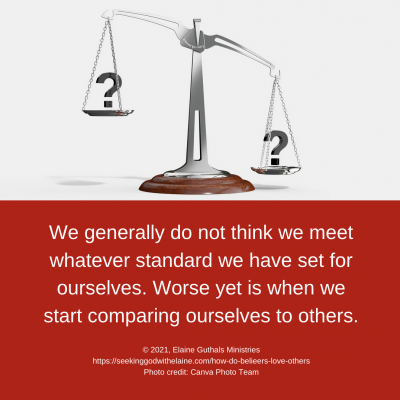Jesus called us to love one another. Specifically, He called us to love our neighbors and our enemies as we do ourselves. This devotion looks at that – because we often don’t love ourselves.
Nuggets
- Jesus specifically gave us the command to love others.
- Others includes our enemies.
- However, we generally don’t love ourselves, making it difficult to love others as ourselves.
To read devotions in the What It Means to Be a Believer series, click the appropriate button below.

Job duty #5 for believers is to love others. Jesus specifically gave us this command. Additionally, there are many verses that tell us we are to do this.
Love People
"This is my commandment, that you love one another as I have loved you" (Jn. 15: 12 ESV)
First Peter 4: 8 says, “Most important of all, continue to show deep love for each other, for love covers a multitude of sins” (NLT). When we love someone, we are more willing to overlook their faults. However, we are also more apt to hold them accountable when we see they are not living the lives they should be living.
We’ve talked previously about who Jesus considered the neighbors that we are supposed to love (Lk. 10: 27). Jesus’ response to the lawyer’s question was that we are to love God and others.
We show we love God by loving others. These others may be people who are different than those who inhabit our normal sphere. We still need to love them.
Love Your Enemies
Jesus also said we are to live our enemies. ““You have heard the law that says, ‘Love your neighbor‘ and hate your enemy. But I say, love your enemies! Pray for those who persecute you! In that way, you will be acting as true children of your Father in heaven. For he gives his sunlight to both the evil and the good, and he sends rain on the just and the unjust alike.” (Mt. 5: 43-45 NLT).
Luke 6: 27-31 expands on that. “But to you who are willing to listen, I say, love your enemies! Do good to those who hate you. Bless those who curse you. Pray for those who hurt you. If someone slaps you on one cheek, offer the other cheek also. If someone demands your coat, offer your shirt also. Give to anyone who asks; and when things are taken away from you, don’t try to get them back. Do to others as you would like them to do to you.” (NLT).
It is much easier to love those who love us. If truth were told, we probably are just indifferent to those who are different from us if we really don’t know them and don’t have to interact with them in a significant way.

That is, though, exactly what Jesus calls for us to do.“But love your enemies, do good to them, and lend to them without expecting to get anything back. Then your reward will be great, and you will be children of the Most High, because he is kind to the ungrateful and wicked” (Lk. 6: 35 NIV). We are to show mercy to them.
We’ve talked before what the definition of mercy is. Mercy is where God doesn’t judge us to the extent He could have.
God expects us to extend this same mercy to others as He has extended to us. The way Jesus said it was “… forgive us our sins, as we have forgiven those who sin against us” (Mt. 6: 12 NLT). God will judge us as we judge others.
Love Others as Ourselves
The kicker is Mark 12: 29-31. “Jesus answered, ‘The most important is, “Hear, O Israel: The Lord our God, the Lord is one. And you shall love the Lord your God with all your heart and with all your soul and with all your mind and with all your strength.” The second is this: “You shall love your neighbor as yourself.” There is no other commandment greater than these'” (Mk. 12 29-31 ESV).
This ‘love others as yourself’ theme is in other verses, too. Romans 13: 8-10 says, “Owe no one anything, except to love each other, for the one who loves another has fulfilled the law. For the commandments, ‘You shall not commit adultery, You shall not murder, You shall not steal, You shall not covet,’ and any other commandment, are summed up in this word: ‘You shall love your neighbor as yourself.’ Love does no wrong to a neighbor; therefore love is the fulfilling of the law” (ESV).
The Golden Rule can be interpret to be talking about just that. Matthew 7: 12 says, “Do for others what you want them to do for you: this is the meaning of the Law of Moses and of the teachings of the prophets” (GNT).
To read a related devotion, click the button below.
We are told to love our enemies as ourselves. The problem is we don’t love ourselves.
We are really critical of ourselves. That can be anything from looks to knowledge to skills.
We generally do not think we meet whatever standard we have set for ourselves. Worse yet is when we start comparing ourselves to others.
So, when it says this is how we are to love others, that sets the bar low in our estimation. However, Jesus was trying to set a high expectation.

Making the Connections
Loving someone is a choice. What? You think we just magically fall in love with someone? But we aren’t talking that romantic kind of love.
We choose to spend time with people. We choose to establish a relationship. We choose to not throw in the towel after the first, and second, and millionth argument.
We choose to love people unconditionally. We choose to work things out.
We choose to love those that are different from us. We choose to love those who hurt us. We choose to love ourselves.
How Do We Apply This?
I googled self-love quotes. It didn’t attribute this quote to anyone, but I think it is a good one. “Eat like you love yourself. Move like you love yourself. Speak like you love yourself. Act like you love yourself.”
Ooo, baby! Have you watched either movies or television shows where something goes wrong, and out comes the ice cream? And then the whole gallon is gone. That sure isn’t eating like we love ourselves, no matter how comforting it can be.
“Speak like you love yourself” — even the thoughts you say in your head. How quickly do we start chewing ourselves up one side and down the other when something either goes wrong or just not he way we planned?
“Act like you love yourself.” Self care can be way down on the list — especially for women/wives/mothers. But we have to take care of ourselves.
Take a look at this other quote. “Loving yourself starts with liking yourself, which starts with respecting yourself, which starts with thinking of yourself in positive ways.” Yep, self-talk really affects how we look at ourselves. We’ve got to reign in those negative thoughts.
Remember I am a fake-it-until-you-make-it girl. Eat, move, speak, and act like you love yourself now until you actually do. That is you choosing to love yourself.

Why should we love those different from us, our enemies, and ourselves? Because God first loved us. He chose to send His Son to die for us (Jn. 3: 16). That makes us all lovable.
Loving Father. Your love is so amazing. Even when we didn’t deserve it, You sent Your Son to die for us. We cannot fathom that, but that is how deep for us Your love is. Help us to love ourselves. Help us to love all people, especially those different from us and our enemies. In this way, we can show our love for You. Amen.
What do you think? How do you think your loving (or not loving) yourself affects how you love others?
Leave me a comment below (about this or anything else) or head over to my Facebook group for some interactive discussion.
If you don’t understand something and would like further clarification, please contact me.
If you have not signed up for the email daily or weekly providing the link to the devotions and the newsletter, do so below.
If God has used this devotion to speak with you, consider sharing it on social media.
Pingback: How Do Non-Preachers Make Disciples? – Seeking God with Elaine
Pingback: What Do You Mean Believers Have Other Duties as Assigned? – Seeking God with Elaine
Pingback: Goodness as a Virtue – Seeking God with Elaine
Pingback: How Does Perseverance Help Consistency? – Seeking God with Elaine
Pingback: Patience as a Virtue – Seeking God with Elaine
Pingback: Jesus, the Good Shepherd – Seeking God with Elaine
Pingback: Evidence of Election – Seeking God with Elaine
Pingback: What Does Omniscience Mean? – Seeking God with Elaine
Pingback: The Debt of Christian Love – Seeking God with Elaine
Pingback: The Prophecy of a Great Light – Seeking God with Elaine
Pingback: What Are the Causes and Effects of Evil? (Part 3) – Seeking God with Elaine
Pingback: A Three-Step Approach to Knowing God – Seeking God with Elaine
Pingback: Forgiven by the Savior – Seeking God with Elaine
Pingback: Attributes of God: Beautiful – Seeking God with Elaine
Pingback: Attributes of God: Providential and Caring – Seeking God with Elaine
Pingback: Transformed to Good – Seeking God with Elaine
Pingback: Focusing Our Thoughts Off of the World – Seeking God with Elaine